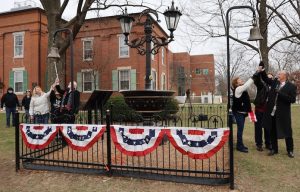Monroe County levees discussed with Corps
County officials and local levee district commissioners met with U.S. Army Corps of Engineers flood safety personnel in Fairview Heights last Wednesday.
The meeting was originally to be held at the Monroe County Courthouse, but was rescheduled due to inclement weather.
Monroe County Commission Chairman Delbert Wittenauer kicked off the meeting by saying the county is vitally interested in the welfare of levees that protect people and property.
“I think that is amply illustrated by the fact that all three of our board of commissioners are here this afternoon,” Wittenauer said.
He also weighed in on the issue of alleged Corps bureaucratic practices.
“I know most levee commissioners are also farmers and are used to seeing a problem and dealing with it directly. But the Corps must follow specific practice and policies,” he said. “This is because of the way they get their funding to help us, working with the Congress and their processes. They don’t have a discretionary pot of money for this.”
Wittenauer also emphasized that it is of vital importance for levee districts to work to meet requirements laid out by the Corps for inspecting and maintaining levees in proper condition to meet requirements of the Public Law 84-99 Inspection and Rehabilitation Program.
“Even if a levee fails to attain and hold those standards, and is thus removed from the program, the Corps will fight alongside you in a flood. But if your levee is damaged, and you have been dropped from the program, the federal government will not be able to step in and pay for repairs,” he said.
Under that law, an acceptable or marginally acceptable levee, if flood damaged, is eligible to receive 90 percent of the costs of repairing the levee from federal funding.
Individual Corps flood risk management personnel then sat down to discuss specific issues noted on area levees in inspections with levee district personnel. They included observations of such issues as vegetation encroachment on levees, animal burrow damage and conditions and maintenance of items such as relief wells, pumps and gravity drains.
The meeting was a two-way discussion, with Corps experts telling what was required to remain in the program, and taking in information and questions from levee district officials, including sharing information.
Corps flood risk reduction expert Matt Hunn acknowledged that, for example, some relief wells that had been judged as deficient might in fact have been replaced by others, and therefore no longer needed to be maintained.
“We might just be able to grout them shut,” Hunn said.
Hunn also asked local levee personnel to note dates and times specific relief wells started to flow, saying that by matching those data points with river elevation measurements, which the Corps maintains, estimates of how well these items are working might be developed.
A wider scope general session followed the first session. It offered metro east levee officials in Madison, St. Clair and Monroe counties opportunities to get an overview of regulations and policies that govern levee issues. The session also allowed the levee districts and Corps flood risk management personnel to ensure emergency management plans and contact lists were up-to-date prior to the next flood season, which commonly occurs each spring.
The inspection and acceptance program discussed in this meeting is aside from the FEMA accreditation process that impacts flood insurance requirements and prices, and includes even lower level agricultural levees in its concerns.






